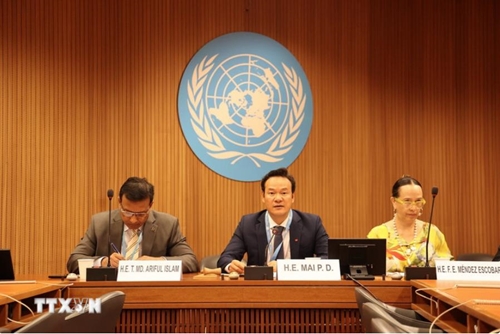His remarks came as a Vietnamese delegation, comprising representatives from the Supreme People’s Court, the Supreme People’s Procuracy, various ministries, and the Government Office, prepared to present a national report on ICCPR compliance at the 144th session of the United Nations Human Rights Committee held on July 7-8.
    |
 |
|
Ambassador Mai Phan Dung (center) speaks at a discussion. |
Dung said Vietnam has actively adopted the committee’s recommendations, maintained regular dialogue, and ensured transparent reporting on its human rights commitments.
Vietnam not only provides updates on its progress but also shares practical experiences, contributing to global discussions on common concerns. These efforts, he said, have been met with positive feedback from international partners, reinforcing Vietnam’s standing and credibility at multilateral forums, including the U.N. Human Rights Council (UNHRC).
Vietnam’s growing reputation has been reflected in its successful bids for seats at the U.N. bodies in recent years. Looking ahead, Dung affirmed Vietnam’s continued active role in addressing key issues at the UNHRC, engaging in constructive dialogue in ongoing efforts to reform the UNHRC and the broader U.N. system. These contributions aim to enhance the U.N.’s capacity to tackle emerging global challenges for peace, development, and prosperity.
Since the start of its current term, Vietnam’s Permanent Mission to Geneva has worked closely with domestic agencies to promote dialogue and cooperation at the UNHRC, Dung said. The mission has spearheaded several initiatives that have gained broad international support. At the UNHRC’s 59th session last week, it hosted a well-received workshop on food system transformation amid climate change.
The country has also spearheaded landmark resolutions, including one marking the 75th anniversary of the Universal Declaration of Human Rights and the 30th anniversary of the Vienna Declaration and Program of Action, co-sponsored by 121 countries. Another resolution, co-sponsored by Bangladesh and the Philippines, focused on ensuring human rights during a just energy transition and was adopted by consensus.
At the UNHRC’s ongoing 59th session, Vietnam continues to advocate for climate finance, technical cooperation, and child protection in cyberspace as a core member of the Human Rights and Climate Change group, he added.
According to him, Vietnam has put forward various initiatives at the UNHRC to advance the protection and promotion of human rights. These include joint statements on key topics such as vaccination and the right to health, gender equality, implementation of the Sustainable Development Goals (SDGs), protection of civilian infrastructure in armed conflicts, climate change and human rights, and the right to food, which have received broad co-sponsorship from numerous member states.
In addition, Vietnam has actively partnered with countries and international organizations to promote other initiatives, including events held on the margins of UNHRC sessions on anti-discrimination, violence, and gender-based harassment in the workplace; the right to immunization and health; mainstreaming human rights education into national education systems; and food systems transformation in the context of climate change to ensure the right to food.
The mission has also been actively involved in the preparation and defense of the country's Universal Periodic Review (UPR) Fourth Cycle report, held in May and September 2024, contributing significantly to the success of the process. As a member of the council, Vietnam also regularly serves on Troika teams, three-country groups that assist in reviewing national reports under the UPR mechanism.
In 2025, the mission successfully collaborated with the Ministry of Home Affairs to defend Vietnam’s national report under the U.N. Convention on the Rights of Persons with Disabilities (CRPD). Looking ahead, it will coordinate with the Ministry of Justice to prepare for Vietnam’s fourth dialogue with the U.N. Human Rights Committee on the ICCPR compliance, widely recognized as the most comprehensive and far-reaching international human rights treaty.
Source: VNA